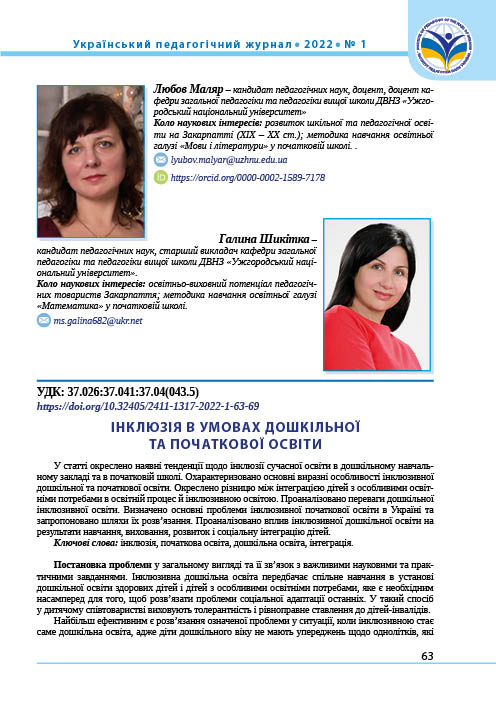Abstract
When it comes to inclusive education, many things remain vague from a parent’s perspective. Especially when it comes to such varieties as preschool and primary education of an inclusive nature. Inclusive preschool education involves joint education in the institution of preschool education of healthy children and children with special needs. This article highlights the answers to the questions that affect inclusive preschool education. The implementation of inclusive preschool education on the results of education and social integration of children is analyzed. The modern educator, therefore, must become a kind of universal, able to design and implement inclusive education for children with virtually any type of disorder. Thus, the inclusiveness of preschool and primary education significantly changes the working conditions of teachers, requires high intellectual and physical qualities, stress, ability to control their emotional state, which, in turn, exacerbates the issue of financing inclusive teaching. The world has long been aware of the high economic cost of inclusive preschool and primary education. The unresolved issue in our country is an important factor that creates negative attitudes of teachers towards the inclusive education of children with special needs. Not surprisingly, many educational institutions prefer to choose for children with disabilities in certain classes, involving them not in joint learning with peers, but in joint extracurricular activities. It should be noted in this regard that the association of children with special needs in a separate class or group does not solve the problem, because the teacher in these circumstances must implement various adapted educational programs. In addition, for the implementation of various correctional courses in some cases you need a teacher, in others – a teacher of the deaf, in others – a teacher of the oligophrenic. And this determines the need to change the staffing of organizations, which does not always correspond to the real capabilities of the educational institution. Our point of view is confirmed by the results of a study of the risks of implementing inclusion in higher education, which shows that one of the significant risk factors in the expansion of inclusive practices is the lack of special professional skills of teachers. In our opinion, it is necessary to expand the inclusive training of students who receive pedagogical education in the field of preschool and primary education. It is worth noting once again that the lack of legal regulation of the number of children with various disabilities in an inclusive classroom, which, in the context of educational orientation on educational outcomes, sigoligophrenicantly complicates the teacher and can reduce the quality of education. The importance of solving these problems is determined by their fundamental importance for the success of the implementation of educational inclusion, and for overcoming the skeptical attitude to it of the teachers themselves, and parents, and society as a whole.
References
Бєлєнька Г. В., Борисова З. Н., Машовець М. А. (2009). Підготовка вихователів до розвитку особистості дитини в дошкільному віці. Київ: Вид-во НПУ ім. М. П. Драгоманова.
Валентик, Н. (2010). Інклюзивна освіта: за і проти. Директор школи (Шкільний світ), 14/15, 45–58.
Давиденко, Г. В. (2015). Впровадження інклюзивної освіти у Великій Британії: проблеми, шляхи вирішення. Актуальні проблеми навчання та виховання людей з особливими потребами, 12, 2015, 27–38.
Софій, Н., Єрмаков, І. (ред.) (2000). Кроки до компетентності та інтеграції в суспільство: наук.-метод. зб. Київ: Контекст.
Саламанська декларація про принципи, політику та практичну діяльність у галузі освіти осіб з особливими освітніми потребами. (1994). https://zakon.rada.gov.ua/laws/show/995_001–94#Text
Шевцов, А. Г. (2004). Методичні основи організації соціальної реабілітації дітей з вадами здоров’я. Київ: НТІ «Інститут соціальної політики».
Колупаєва, А. А. (2007). Інклюзивні тенденції сучасної спеціальної освіти. Дидакт. та соціал.-психолог. аспекти корект. роботи у спец. шк.: наук.-метод. зб., 9.
Колупеєва, А.А. & Таранченко О. М. (2019). Навчання дітей з особливими освітніми потребами в інклюзивному середовищі: навчально-методичний посібник. Харків: Ранок.
Bielienka H. V., Borysova Z. N., Mashovets M. A. (2009). Pidhotovka vykhovateliv do rozvytku osobystosti dytyny v doshkilnomu vitsi. Kyiv: Vyd-vo NPU im. M. P. Drahomanova. (in Ukrainian).
Valentyk, N. (2010). Inkliuzyvna osvita: za i proty. Dyrektor shkoly (Shkilnyi svit), 14/15, 45–58. (in Ukrainian).
Davydenko, H. V. (2015). Vprovadzhennia inkliuzyvnoi osvity u Velykii Brytanii: problemy, shliakhy vyrishennia. Aktualni problemy navchannia ta vykhovannia liudei z osoblyvymy potrebamy, 12, 2015, 27–38. (in Ukrainian).
Sofii, N., Yermakov, I. (red.) (2000). Kroky do kompetentnosti ta intehratsii v suspilstvo: nauk.-metod. zb. Kyiv: Kontekst. (in Ukrainian).
Salamanska deklaratsiia pro pryntsypy, polityku ta praktychnu diialnist u haluzi osvity osib z osoblyvymy osvitnimy potrebamy. (1994). https://zakon.rada.gov.ua/laws/show/995_001–94#Text (in Ukrainian).
Shevtsov, A. H. (2004). Metodychni osnovy orhanizatsii sotsialnoi reabilitatsii ditei z vadamy zdorovia. Kyiv: NTI «Instytut sotsialnoi polityky». (in Ukrainian).
Kolupaieva, A. A. (2007). Inkliuzyvni tendentsii suchasnoi spetsialnoi osvity. Dydakt. ta sotsial.-psykholoh. aspekty korekt. roboty u spets. shk.: nauk.-metod. zb., 9 (in Ukrainian).
Kolupeieva, A.A. & Taranchenko O. M. (2019). Navchannia ditei z osoblyvymy osvitnimy potrebamy v inkliuzyvnomu seredovyshchi: navchalno-metodychnyi posibnyk. Kharkiv: Ranok (in Ukrainian).

This work is licensed under a Creative Commons Attribution-NonCommercial-ShareAlike 4.0 International License.
Copyright (c) 2022 Любов Маляр, Галина Шикітка

